The global industrial water analysis market is valued at USD 755.1 million in 2025. It is slated to reach USD 1,277.7 million by 2035, recording an absolute increase of USD 522.6 million over the forecast period. This translates into a total growth of 69.2%, with the market forecast to expand at a compound annual growth rate (CAGR) of 5.4% between 2025 and 2035. The overall market size is expected to grow by nearly 1.69X during the same period, supported by increasing demand for water quality monitoring in industrial processes, growing adoption of stringent environmental regulations, and rising industrial emphasis on sustainable water management practices across diverse manufacturing and processing applications.
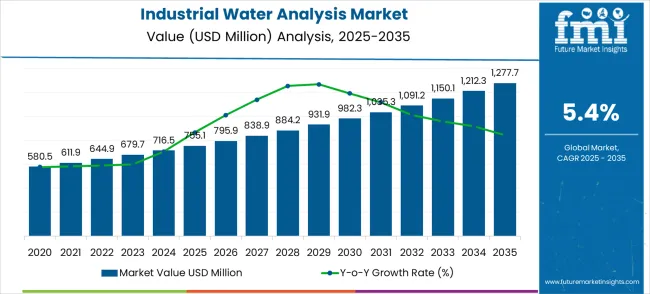
| Metric | Value |
|---|---|
| Estimated Value in (2025E) | USD 755.1 million |
| Forecast Value in (2035F) | USD 1,277.7 million |
| Forecast CAGR (2025 to 2035) | 5.4% |
From 2030 to 2035, the market is forecast to grow from USD 982.3 million to USD 1,277.7 million, adding another USD 295.4 million, which constitutes 56.5% of the overall ten-year expansion. This period is expected to be characterized by the expansion of advanced analytical technologies, the integration of IoT-enabled monitoring systems, and the development of comprehensive water management solutions incorporating predictive analytics and automated reporting capabilities. The growing adoption of circular economy principles and zero liquid discharge systems will drive demand for water analysis services with enhanced contamination detection and process optimization features.
Between 2020 and 2025, the industrial water analysis market experienced steady growth, driven by increasing environmental awareness and growing recognition of water quality monitoring as essential for regulatory compliance and operational efficiency in industrial processes. The market developed as industrial operators recognized the potential for comprehensive water analysis to enhance process control while reducing environmental impact and ensuring regulatory adherence. Technological advancement in analytical instruments and automated monitoring systems began emphasizing the critical importance of maintaining water quality standards and operational sustainability in industrial applications.
Market expansion is being supported by the increasing global emphasis on environmental sustainability and the corresponding need for comprehensive water quality monitoring that can ensure regulatory compliance and operational efficiency while maintaining ecological protection across various industrial processes and manufacturing operations. Modern industrial facilities are increasingly focused on implementing water management solutions that can deliver accurate contamination detection, optimize water usage, and provide reliable monitoring results in complex industrial environments. Industrial water analysis services' proven ability to provide regulatory compliance support, environmental risk mitigation, and operational optimization makes them essential services for contemporary industrial operations and sustainable manufacturing practices.
The growing emphasis on water conservation and circular economy approaches is driving demand for industrial water analysis services that can support advanced water recycling systems, enable process optimization, and reduce operational costs through enhanced water quality monitoring and treatment effectiveness. Industrial operators' preference for services that combine analytical accuracy with regulatory expertise and cost-effectiveness is creating opportunities for innovative implementations of analysis services. The rising influence of environmental regulations and sustainability reporting requirements is also contributing to increased adoption of water analysis services that can provide comprehensive monitoring solutions without compromising operational efficiency or environmental compliance.
The market is segmented by analysis type, application, and region. By analysis type, the market is divided into physical analysis, chemical analysis, and microbiological analysis. Based on application, the market is categorized into oil & gas, mineral, manufacturing, chemical industry, pharmaceuticals, and others. Regionally, the market is divided into North America, Europe, East Asia, South Asia & Pacific, Latin America, and the Middle East & Africa.
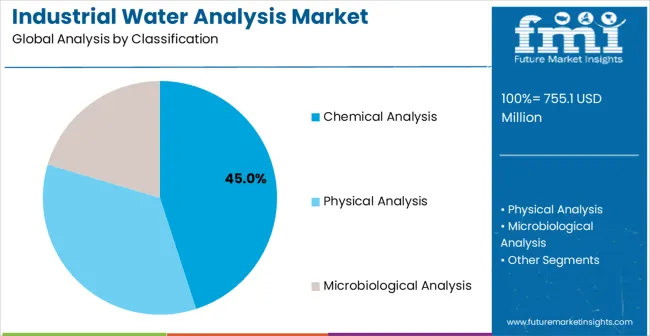
The chemical analysis segment is projected to account for 45% of the industrial water analysis market in 2025, reaffirming its position as the leading category of analysis types. Industrial facilities increasingly utilize chemical analysis services for their comprehensive contamination detection capabilities, regulatory compliance support, and essential role in monitoring chemical parameters across water treatment, process monitoring, and environmental compliance applications. Chemical analysis technology's established methodologies and broad applicability directly address the industrial requirements for reliable contamination detection and operational efficiency in large-scale industrial operations.
This analysis type segment forms the foundation of modern industrial water monitoring operations, as it represents the analytical approach with the greatest versatility and established market demand across multiple industrial sectors and regulatory applications. Service provider investments in enhanced analytical equipment and automated testing capabilities continue to strengthen adoption among industrial facilities. With industrial operators prioritizing regulatory compliance and environmental protection, chemical analysis services align with both operational efficiency objectives and sustainability requirements, making them the central component of comprehensive water management strategies.
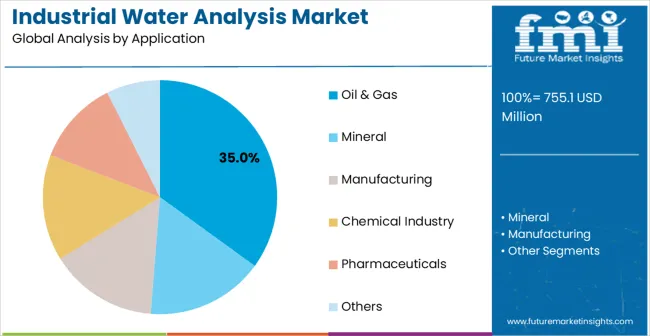
Oil & gas operations are projected to represent 35% of industrial water analysis demand in 2025, underscoring their critical role as the primary consumers of comprehensive water monitoring services for produced water treatment, drilling operations, and environmental compliance applications. Oil & gas operators prefer industrial water analysis services for their specialized expertise in hydrocarbon contamination detection, regulatory knowledge, and ability to enhance operational compliance while reducing environmental risks and treatment costs. Positioned as essential services for modern oil & gas operations, water analysis providers offer both analytical advantages and regulatory support benefits.
The segment is supported by continuous innovation in analytical technologies and the growing availability of specialized testing methods that enable advanced contamination detection with enhanced sensitivity and accuracy capabilities. Additionally, oil & gas operators are investing in comprehensive environmental monitoring systems to support regulatory compliance and sustainability initiatives. As environmental regulations become more stringent and operational complexity increases, oil & gas will continue to dominate the application market while supporting advanced analytical service utilization and ecological compliance strategies.
The industrial water analysis market is advancing steadily due to increasing environmental regulatory requirements and growing demand for comprehensive water quality monitoring that provides accurate contamination detection and regulatory compliance support across diverse industrial applications and manufacturing processes. However, the market faces challenges, including high analytical service costs, complex regulatory landscapes, and the need for specialized expertise and equipment investments. Innovation in automated analytical systems and real-time monitoring technologies continues to influence service development and market expansion patterns.
The growing adoption of automated analytical instruments and continuous monitoring technologies is enabling service providers to deliver advanced water analysis services with enhanced accuracy, improved efficiency, and real-time data reporting capabilities. Automated analytical systems provide better data quality while allowing more comprehensive monitoring coverage and consistent testing protocols across various industrial applications. Service providers are increasingly recognizing the competitive advantages of automated capabilities for service differentiation and premium market positioning.
Modern industrial water analysis providers are incorporating IoT-enabled monitoring devices and digital data management platforms to enhance service accessibility, enable remote monitoring capabilities, and provide comprehensive reporting solutions for regulatory compliance and operational optimization. These technologies improve service efficiency while enabling new capabilities, including predictive analytics and automated alert systems. Advanced digital integration also allows providers to support scalable service models and enhanced functionality beyond traditional laboratory-based analysis services.
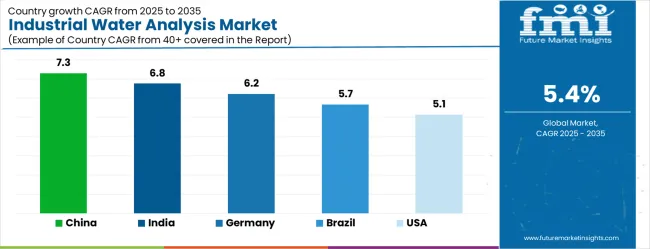
| Country | CAGR (2025-2035) |
|---|---|
| China | 7.3% |
| India | 6.8% |
| Germany | 6.2% |
| Brazil | 5.7% |
| USA | 5.1% |
| UK | 4.6% |
| Japan | 4.1% |
The industrial water analysis market is experiencing moderate growth globally, with China leading at a 7.3% CAGR through 2035, driven by the expanding industrial manufacturing sector, increasing environmental regulations implementation, and significant government investment in pollution control and water management infrastructure. India follows at 6.8%, supported by rapid industrial development, growing ecological awareness, and increasing adoption of water quality monitoring in manufacturing facilities. Germany shows growth at 6.2%, emphasizing technological innovation and environmental compliance excellence. Brazil records 5.7%, focusing on industrial expansion and ecological regulation strengthening. The USA demonstrates 5.1% growth, prioritizing advanced analytical technologies and regulatory compliance services. The UK exhibits 4.6% growth, with a focus on environmental sustainability and industrial automation. Japan shows 4.1% growth, supported by advanced industrial processes and precision analytical technologies.
The report covers an in-depth analysis of 40+ countries top-performing countries are highlighted below.
Revenue from industrial water analysis services in China is projected to exhibit strong growth with a CAGR of 7.3% through 2035, driven by rapidly expanding industrial manufacturing infrastructure and increasingly stringent environmental regulations supported by government pollution control initiatives and sustainable development policies. The country's massive industrial sector and growing emphasis on environmental compliance are creating substantial demand for comprehensive water quality monitoring services. Major analytical service providers and environmental consulting companies are establishing extensive capabilities to serve both domestic industrial facilities and international manufacturing operations.
Revenue from industrial water analysis services in India is expanding at a CAGR of 6.8%, supported by the country's rapid industrial development, increasing environmental awareness, and growing adoption of water quality monitoring systems in manufacturing and processing facilities. The country's expanding industrial infrastructure and rising focus on environmental sustainability are driving demand for comprehensive analytical services. International analytical service providers and domestic laboratories are establishing extensive operations to address the growing demand for industrial water monitoring solutions.
Revenue from industrial water analysis services in Germany is expanding at a CAGR of 6.2%, supported by the country's advanced environmental standards, strong emphasis on technological innovation, and robust demand for high-quality analytical services among precision manufacturing and chemical industry operations. The nation's mature industrial sector and commitment to environmental excellence are driving sophisticated analytical service integration throughout manufacturing facilities and processing operations. Leading analytical companies and ecological consultancies are investing extensively in the development of premium services and advanced analytical technologies to serve both domestic and European markets.
Revenue from industrial water analysis services in Brazil is growing at a CAGR of 5.7%, driven by expanding industrial infrastructure, strengthening environmental regulations, and increasing investment in water management and pollution control systems across major industrial regions. The country's developing industrial sector and rising ecological compliance requirements are supporting demand for analytical services. Service providers and environmental consultancies are establishing comprehensive capabilities to serve growing industrial demand and regulatory compliance needs.
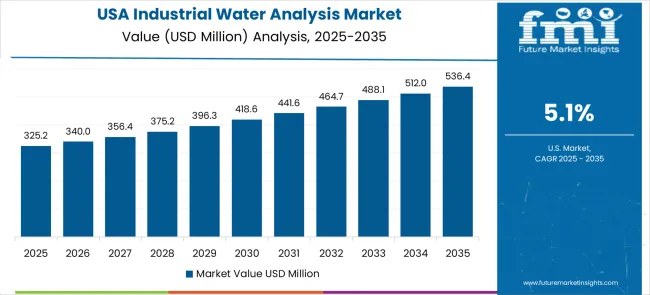
Revenue from industrial water analysis services in the USA is expanding at a CAGR of 5.1%, supported by the country's advanced industrial sector, strong emphasis on environmental regulations, and established demand for comprehensive analytical services among manufacturing facilities and processing operations. The USA's mature analytical service industry and leadership in ecological compliance are driving demand for sophisticated monitoring services focusing on regulatory adherence and operational optimization. Service providers are investing in comprehensive capabilities to serve diverse industrial sectors with advanced analytical solutions.
Revenue from industrial water analysis services in the UK is growing at a CAGR of 4.6%, driven by the country's commitment to environmental sustainability, emphasis on industrial automation, and strong demand for regulatory compliance services in manufacturing and processing operations. The UK's established environmental regulatory framework and focus on sustainable industrial practices are supporting investment in comprehensive analytical services. Service providers are establishing advanced capabilities to serve both domestic industrial facilities and European market requirements.
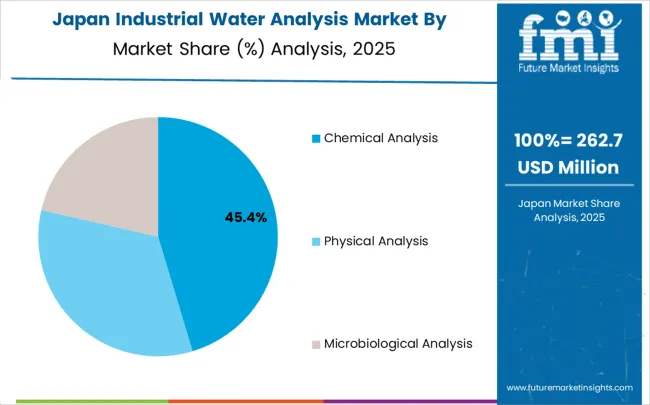
Revenue from industrial water analysis services in Japan is expanding at a CAGR of 4.1%, supported by the country's focus on advanced industrial processes, precision analytical technologies, and strong emphasis on quality control and environmental protection in manufacturing operations. Japan's sophisticated industrial sector and commitment to technological excellence are driving demand for high-precision analytical services, including advanced testing methods and comprehensive quality assurance. Leading analytical companies are investing in specialized capabilities to serve domestic industrial facilities with premium monitoring and analysis services.
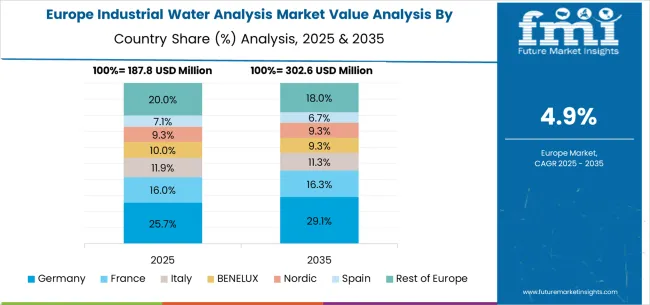
The industrial water analysis market in Europe is projected to grow from USD 166.1 million in 2025 to USD 281.1 million by 2035, registering a CAGR of 5.4% over the forecast period. Germany is expected to maintain its leadership position with a 30.0% market share in 2025, declining slightly to 29.5% by 2035, supported by its strong industrial sector, advanced analytical service infrastructure, and comprehensive environmental compliance service network serving major European markets.
France follows with a 17.5% share in 2025, projected to reach 18.0% by 2035, driven by robust demand for environmental monitoring services, advanced industrial operations, and comprehensive water management programs, combined with established regulatory frameworks incorporating strict water quality standards. The United Kingdom holds a 15.5% share in 2025, expected to decrease to 15.0% by 2035, supported by strong environmental regulations but facing challenges from economic conditions and competitive pressures from continental service providers. Italy commands a 12.5% share in 2025, projected to reach 12.7% by 2035, while Spain accounts for 9.5% in 2025, expected to reach 9.8% by 2035. The Netherlands maintains a 4.5% share in 2025, growing to 4.7% by 2035. The Rest of Europe region, including Nordic countries, Eastern Europe, Portugal, Belgium, Switzerland, and Austria, is anticipated to maintain stability, with its collective share remaining at 10.5% to 10.3% by 2035, attributed to the steady adoption of environmental monitoring services in Nordic countries and growing industrial activities across Eastern European markets implementing ecological compliance programs.
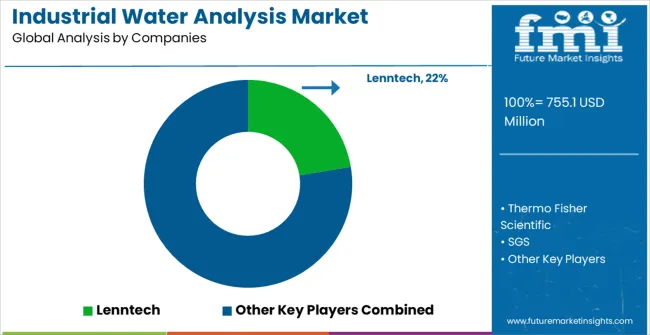
The industrial water analysis market is characterized by competition among established analytical service providers, specialized environmental consulting companies, and integrated testing laboratory networks. Companies are investing in advanced analytical equipment, regulatory expertise development, service quality systems, and comprehensive service portfolios to deliver accurate, reliable, and compliant analytical solutions. Innovation in automated testing systems, digital reporting platforms, and specialized analytical methods is central to strengthening market position and competitive advantage.
Lenntech leads the market with a strong market share, offering comprehensive water treatment and analysis solutions with a focus on industrial applications and environmental compliance. Thermo Fisher Scientific provides specialized analytical instruments and laboratory services with an emphasis on precision testing and advanced analytical capabilities. SGS delivers global testing and certification services with a focus on industrial compliance and quality assurance. Intertek specializes in testing and inspection services for diverse industrial sectors. Element focuses on advanced materials testing and analytical services for industrial applications. TÜV SÜD offers comprehensive testing and certification services with emphasis on industrial safety and environmental compliance.
The industrial water analysis market, valued at USD 755.1 million in 2025 and projected to reach USD 1,277.7 million by 2035 at a 5.4% CAGR, represents a critical environmental compliance and operational efficiency segment driven by stringent regulations and sustainability imperatives. Led by oil & gas applications (35.0% market share) and chemical analysis services (45.0% of analysis types), the market faces challenges including high service costs, complex regulatory landscapes, and the need for specialized expertise. Success requires coordinated efforts across regulatory bodies, analytical service providers, industrial operators, technology developers, and environmental consultants.
How Governments Could Strengthen Environmental Compliance and Industry Capabilities?
How Industry Associations Could Advance Analytical Standards and Best Practices?
How Analytical Service Providers Could Enhance Capabilities and Market Position?
How Industrial Operators Could Optimize Water Management and Compliance?
How Investors and Financial Enablers Could Support Market Development?
| Items | Values |
|---|---|
| Quantitative Units (2025) | USD 755.1 million |
| Analysis Type | Physical Analysis, Chemical Analysis, Microbiological Analysis |
| Application | Oil & Gas, Mineral, Manufacturing, Chemical Industry, Pharmaceuticals, Others |
| Regions Covered | North America, Europe, East Asia, South Asia & Pacific, Latin America, Middle East & Africa |
| Countries Covered | United States, Canada, United Kingdom, Germany, France, China, Japan, South Korea, India, Brazil, Australia and 40+ countries |
| Key Companies Profiled | Lenntech, Thermo Fisher Scientific, SGS, Intertek, Element, and TÜV SÜD |
| Additional Attributes | Dollar sales by analysis type and application category, regional demand trends, competitive landscape, technological advancements in analytical systems, automated monitoring integration, digital reporting innovation, and supply chain optimization |
The global industrial water analysis market is estimated to be valued at USD 755.1 million in 2025.
The market size for the industrial water analysis market is projected to reach USD 1,277.7 million by 2035.
The industrial water analysis market is expected to grow at a 5.4% CAGR between 2025 and 2035.
The key product types in industrial water analysis market are chemical analysis, physical analysis and microbiological analysis.
In terms of application, oil & gas segment to command 35.0% share in the industrial water analysis market in 2025.






Our Research Products

The "Full Research Suite" delivers actionable market intel, deep dives on markets or technologies, so clients act faster, cut risk, and unlock growth.

The Leaderboard benchmarks and ranks top vendors, classifying them as Established Leaders, Leading Challengers, or Disruptors & Challengers.

Locates where complements amplify value and substitutes erode it, forecasting net impact by horizon

We deliver granular, decision-grade intel: market sizing, 5-year forecasts, pricing, adoption, usage, revenue, and operational KPIs—plus competitor tracking, regulation, and value chains—across 60 countries broadly.

Spot the shifts before they hit your P&L. We track inflection points, adoption curves, pricing moves, and ecosystem plays to show where demand is heading, why it is changing, and what to do next across high-growth markets and disruptive tech

Real-time reads of user behavior. We track shifting priorities, perceptions of today’s and next-gen services, and provider experience, then pace how fast tech moves from trial to adoption, blending buyer, consumer, and channel inputs with social signals (#WhySwitch, #UX).

Partner with our analyst team to build a custom report designed around your business priorities. From analysing market trends to assessing competitors or crafting bespoke datasets, we tailor insights to your needs.
Supplier Intelligence
Discovery & Profiling
Capacity & Footprint
Performance & Risk
Compliance & Governance
Commercial Readiness
Who Supplies Whom
Scorecards & Shortlists
Playbooks & Docs
Category Intelligence
Definition & Scope
Demand & Use Cases
Cost Drivers
Market Structure
Supply Chain Map
Trade & Policy
Operating Norms
Deliverables
Buyer Intelligence
Account Basics
Spend & Scope
Procurement Model
Vendor Requirements
Terms & Policies
Entry Strategy
Pain Points & Triggers
Outputs
Pricing Analysis
Benchmarks
Trends
Should-Cost
Indexation
Landed Cost
Commercial Terms
Deliverables
Brand Analysis
Positioning & Value Prop
Share & Presence
Customer Evidence
Go-to-Market
Digital & Reputation
Compliance & Trust
KPIs & Gaps
Outputs
Full Research Suite comprises of:
Market outlook & trends analysis
Interviews & case studies
Strategic recommendations
Vendor profiles & capabilities analysis
5-year forecasts
8 regions and 60+ country-level data splits
Market segment data splits
12 months of continuous data updates
DELIVERED AS:
PDF EXCEL ONLINE
Industrial Water Chiller for PCB Market Size and Share Forecast Outlook 2025 to 2035
Industrial Water Treatment Market Size and Share Forecast Outlook 2025 to 2035
Industrial Water Cooling System Market Growth – Trends & Forecast 2025-2035
Industrial Wastewater Treatment Chemical Market Insights - Growth & Demand 2025 to 2035
Industrial Solar Water Heaters Market Growth – Trends & Forecast 2025 to 2035
Industrial Process Water Coolers Market Forecast and Outlook 2025 to 2035
Demand for Industrial Solar Water Heaters in USA Size and Share Forecast Outlook 2025 to 2035
Industrial Grade Electrochemical CO Sensor Market Size and Share Forecast Outlook 2025 to 2035
Industrial Bench Scale Market Size and Share Forecast Outlook 2025 to 2035
Industrial Low Profile Floor Scale Market Size and Share Forecast Outlook 2025 to 2035
Industrial Sand Mill Market Size and Share Forecast Outlook 2025 to 2035
Industrial Control Network Modules Market Size and Share Forecast Outlook 2025 to 2035
Water Vapor Permeability Analyzers Market Size and Share Forecast Outlook 2025 to 2035
Industrial Precision Oven Market Size and Share Forecast Outlook 2025 to 2035
Industrial & Commercial HVLS Fans Market Size and Share Forecast Outlook 2025 to 2035
Industrial Robot Controller Market Size and Share Forecast Outlook 2025 to 2035
Water and Waste Water Treatment Chemical Market Size and Share Forecast Outlook 2025 to 2035
Industrial Wired Routers Market Size and Share Forecast Outlook 2025 to 2035
Industrial Evaporative Condensers Market Size and Share Forecast Outlook 2025 to 2035
Water-cooled Walk-in Temperature & Humidity Chamber Market Size and Share Forecast Outlook 2025 to 2035

Thank you!
You will receive an email from our Business Development Manager. Please be sure to check your SPAM/JUNK folder too.
Chat With
MaRIA